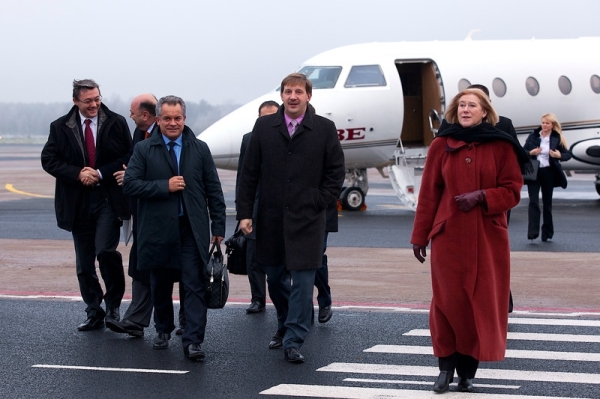Two oligarchs who fled Moldova in crosshairs for EU sanctions
EU countries are edging forward on new Moldova sanctions that could see two notorious oligarchs face a visa-ban and asset-freeze.
Romania first proposed the measures back in February amid US and EU warnings that Russia is plotting to overthrow the pro-Western government in Chișinău.
-

Ilhan Shor lives in Israel (Photo: parlament.md)
The EU is also buying new equipment for Moldova’s army and sending counter-espionage experts amid the heightened tensions.
And Moldovan authorities have made public intelligence alerts that the two exiled tycoons — Vladimir Plahotniuc and Ilan Shor — are allegedly involved in the Kremlin’s dirty tricks.
"We’re asking the EU to sanction some fugitive oligarchs who’ve eroded democracy in the Republic of Moldova," Igor Zaharov, Moldova’s foreign ministry spokesman, told EUobserver on Thursday (13 April).
"We’re asking the EU to replicate sanctions imposed by the US and UK," he added.
The US listed the two men last October on grounds of helping Russia to "subvert democracy". The UK did likewise in December.
Plahotniuc and Shor fled Moldova after being accused of helping to plunder $1bn (€0.9bn) from its banks some 10 years ago.
Shor lives in Israel and funds a pro-Russian populist party in Moldova called ȘOR, which organises violent anti-government rallies.
Plahotniuc last popped up on the radar in 2019 when he applied for and failed to get US asylum, claiming his life was in danger. His current whereabouts are unknown.
Romania’s blueprint concerns "a new EU sanctions regime that would seek to counter actions aimed at destabilising the Republic of Moldova", its foreign minister recently said.
The EU foreign service declined to say if EU foreign ministers would discuss it at their next meeting on 24 April.
"All decisions on imposing new sanctions are made by member states in the Council through unanimity. Discussions are confidential," it said.
But one EU diplomat said there was an "overall positive attitude toward the [Romanian] proposal," following initial consultations.
"It’s a whole new sanctions regime [legal act], so it will take time," a second EU diplomat added, when asked if it might be ready in time for the 24 April ministerial.
Meanwhile, six Romanian MEPs also shed light on what’s likely to be cooking in a letter to the Swedish EU presidency on Wednesday.
"Vladimir Plahotniuc and Ilan Shor ... should also be targeted under the EU sanctions regime on the basis of misappropriations, election interference and corruption, on the same basis Viktor Yanukovych and his son were sanctioned," they said.
The EU blacklisted former Ukrainian president Yanukovych in 2014 on grounds of being a "person subject to criminal proceedings by the Ukrainian authorities for the misappropriation of public funds or assets".
Moscow was "using corrupted oligarchs" as "its weapon to hamper Moldova’s European perspectives," Vlad Gheorghe, a Romanian liberal MEP who co-signed the Swedish presidency letter, told EUobserver.
"If we fight against Russian armed aggression in Ukraine, we must also fight against pro-Russian oligarchs in Moldova," Gheorghe said.
Deja vu
Gheorghe already wrote to EU foreign affairs chief Josep Borrell with a similar request in January.
The MEP said at the time Plahotniuc and Shor should be listed under an existing EU human-rights sanctions act.
But EU institutions are wary of legal niceties following a rash of lost cases on sanctions appeals in the EU court in Luxembourg.
"Please note, however, that corruption and election interference are not a listing criteria under the EU Global Human Rights Sanctions Regime", Borrell told Gheorghe in his January reply.
"The possible establishment and use of a foreign policy sanctions tool to tackle corruption in third countries would also require a unanimous decision by the EU member states," he added.
"I am pleased to advise that the council is currently looking into this question," Borrell said.

